RISD Students for Justice in Palestine stage sit-in over Gaza
Students are demanding divestment, disclosure, a student oversight committee on financials, and that the school's President condemn "the Israeli occupation of Gaza as a genocide."
Update 7:54 pm:
Between 150-200 students gathered outside the Rhode Island School of Design (RISD) offices at 20 Washington Place in Providence this morning around 9 am. Inside the office building, 21 students and one Providence community member are occupying the lobby until their demands are met. In a statement, organizers from RISD SJP (Students for Justice in Palestine) write:
“RISD SJP will not leave the 20 Washington Place building, otherwise known as ‘Prov-Wash’, until RISD President Crystal Williams:
Provides total fiscal transparency of RISD’s investment portfolio;
Commits to a holistic divestment from companies, corporations, and institutions that are implicated in sustaining Israeli Apartheid;
Establishes a student oversight committee for future investments;
Publicly condemns the Israeli Occupation of Gaza as a genocide.”
Outside, students banged drums and chanted, supporting those occupying and using the time to participate in teach-ins by RISD and Brown faculty, art builds, dabke dancing, and picketing throughout the day.
At around 9:30 am, two students addressed the crowd outside through the main entrance.
First Student: First off, I want to thank each and every one of you for being here and supporting us today. We know that RISD will have to hear our demand and accept a holistic divestment from Textron, including issuing a statement calling the Palestinian Genocide what it is.
“We are calling on RISD to cut ties with any company profiting from this genocide. We still send students to Textron! Shame! It is amazing to know that we are all standing here together, united for the liberation of Palestine and those suffering. This past year has been a time of constant reflection for all of us as we recognize our privilege as students at universities when there are no universities left in Gaza.
“Let us take our opportunity to be here at this institution and be the voice for those who have had their voices taken from them. As a Jewish student, this conflict has brought up 75 years of suppressed, unsaid words and questions amidst the Jewish community. I remember being told by family members from a young age to not ever criticize Israel or be taken from us. In reality, if I had not just listened to my relative, I would've realized that criticism and protest against this regime is not a call for the forced removal of Jews from Palestine is a call for the end of the oppression of all Palestinians. Liberating all of Palestine requires not an eradication of Jews, but of the governing body that made this ethnic cleansing take place.
“Now is the time to voice the comments that have been circling our heads as children that when brought up were always quickly shushed and dismissed. It is time to answer the voice in our head that felt the pain of our Palestinian brothers and sisters. It is the time to address our collective generational trauma and to heal from it by making sure no more people know such pain as those in Gaza.
“Right now, Israeli policy is contrary to the ideals of Judaism in every way. One of the most central concepts in Judaism is that of Tikkun olam or, preparing the world. This means that we have a responsibility to repair what has been broken and call out injustice when we see it. That is my life's purpose and it should be everyone else's. As artists, it's what first drew us to this field. It's what brought us to RISD. So RISD, hear us united - students of every religion, race, class, ethnicity, and background, standing together and asking you for student oversight for future investments and presidential condemnation of this genocide.
Second Student: I want to reify our participation in this movement. This is not an issue of religion that we are engaged with. This is not a religious issue. This is a case of genocide. We're looking at ethnic cleansing. We're not looking at religious conflict. At the core of the Jewish model of justice, since the idea of the covenant, in the text of the Jewish Exodus, after arriving at Mount Sinai, liberated Jewish slaves of Egypt entered into a covenant with God. The covenant included specific provisions for human relations, including establishing fair courts, protecting the vulnerable - the non-Israelites, the widows, the orphans, and the poor - lending to the needy without interest, and treating wage laborers fairly.
“Ever since I grew up, I was told I was a bad Jew. I went to school with many other privileged Jewish children. I went to a Quaker school that upheld the values of peace and non-conflict. The children I went to school with were told that the Israeli state supported these ideas of peace and non-conflict. Does that sound right to you all?
“I was told I was a bad Jew for not supporting this. I had a kid tell me to my face that I'm not a real Jew if I do not go on my birthright trip. Is it my birthright, as a person of European descent, to live on land that is not mine?
“I would like to read quotes from contemporary Jewish thinker Rabbi Brant Rosen. He writes,
“‘In other words, the “victim narrative,’ while understandable, has led Israel to a tragic and desperate place. But while we may appreciate the reality of the historic anti-Semitism that has led to it, I don’t think it is at all fruitful to weigh it against the injustices Israel has perpetrated—and continues to perpetrate—against Palestinians. Toba claims that the justice narrative can play into anti-Semitic images, but while this may be so, it hardly mitigates the need for justice for Palestinians. If there are anti-Semites supporting justice for Palestinians, they must be called out at all costs. But it is certainly not anti-Semitic to suggest that Israel is the more overwhelmingly powerful party in this conflict and that it often wields its power in unjust and oppressive ways.
“‘So where does this leave us in the American Jewish community? Is it possible, as Toba suggests, for us “to wrestle together with the questions that arise when we seriously engage with the Israeli-Palestinian conflict?” For many years, this question was at the forefront of my work as a rabbi. But while I respect those who do attempt to bridge this gulf inside the Jewish community, I personally believe there is more important work to be done. When a people is being oppressed—particularly when that oppression is being perpetrated in my name as a Jew—I believe that the most important question to ask is, quite simply: “What must I do to end this oppression?” ...
“‘In the end, isn’t it more naïve to suggest that Israelis will somehow see fit to offer freedom to Palestinians on their own, without the application of external pressure?’”
Here’s the video:
In a press release, organizers write:
“This action follows RISD SJP launching a strike on May 1 in solidarity with Gaza, the Palestinian Youth Movement, and National Students for Justice in Palestine. They called on faculty, academic workers, and students to join the student movement by withholding their labor from universities that are complicit in the genocide. As of today, May 6th, 2024, at least 35,114 Palestinians have been killed and 82,667 wounded in Israeli attacks on Gaza, as reported by Al Jazeera. It has been seven months of no response and no action—material and symbolic change must happen now.
“In response to the launch of the strike, the RISD administration held a meeting with representatives of RISD SJP to discuss our demands on Thursday, May 2nd. RISD SJP asked for a holistic divestment from Israel’s apartheid regime and full financial disclosure from Textron and counterpart companies. In response, RISD president Crystal Williams sent an email to students, faculty, and staff which stated that RISD's ‘investment portfolio is overwhelmingly aligned with our stated values and the concerns shared with us by RSJP.’ This response falls short of RISD SJP’s demands for fiscal transparency and a concrete divestment plan. RISD SJP asked the administration for a student oversight committee on financial decisions similar to Brown University's ACCRIP (Advisory Committee on Corporate Responsibility and Investment Policy).
“They claimed this was impossible because of fiduciary laws, but did not provide a sufficient alternative. Finally, RISD SJP asked for a letter of acknowledgment and public condemnation of the genocide in Gaza. Administrators told RISD SJP that there would ‘never be words’ that would resonate with the entire community, and thus, that this too was impossible.
“This discussion with the administration did not meet any demands. They continue to sidestep the demands through technicalities, rhetoric, and diversions. The RISD Administration is planning to bring RISD SJP’s demands to President Williams’ Cabinet on Tuesday, May 7th.
“Williams told the RISD community that ‘about a decade ago, RISD adopted an ESG investment philosophy.’ The ESG (environmental, social, and governance) criteria are the result of student activism aiming for divestment from companies related to fossil fuels. Because of this legacy of RISD student activism, a holistic financial divestment from the Israeli occupation of Palestine is possible.
“RISD Students for Justice in Palestine call on RISD to do its part to promote an immediate ceasefire and end the genocide in Gaza by divesting from the State of Israel’s military occupation.”
RISD Senior Director of Public Relations Jaime Marland issued the following statement:
“We affirm our students’ right to freedom of expression, freedom of speech, and peaceful assembly. RISD condemns violence and injustice, and we decry antisemitism, Islamophobia, and all forms of hate. The well-being of all of our students has been and remains our top priority, and we continue to support all members of our community.”

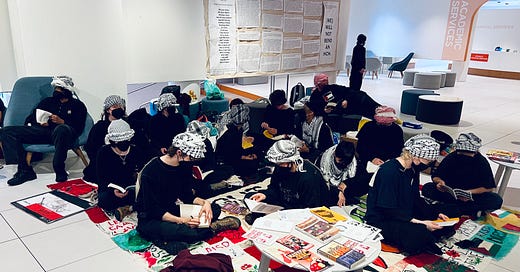



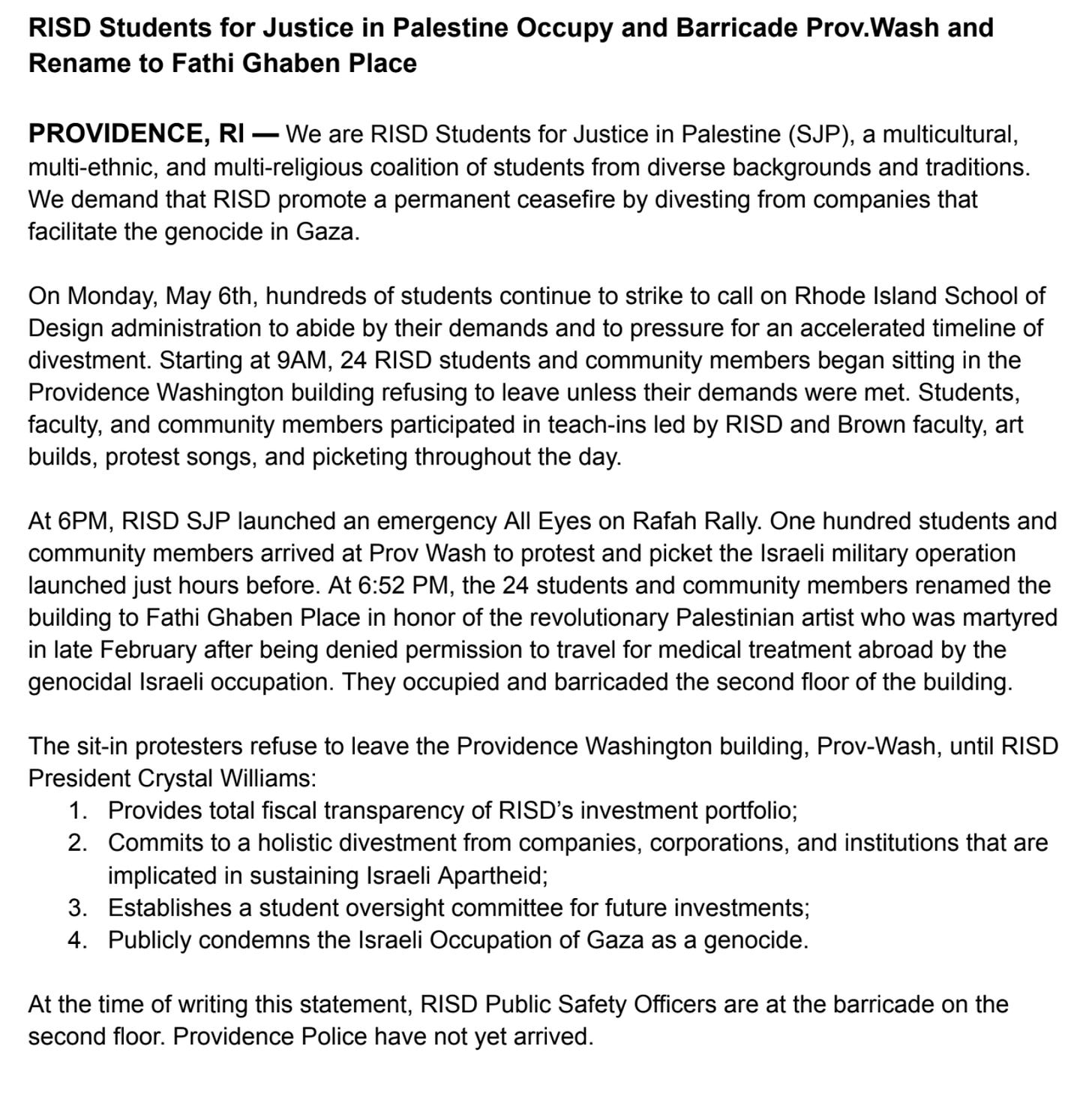

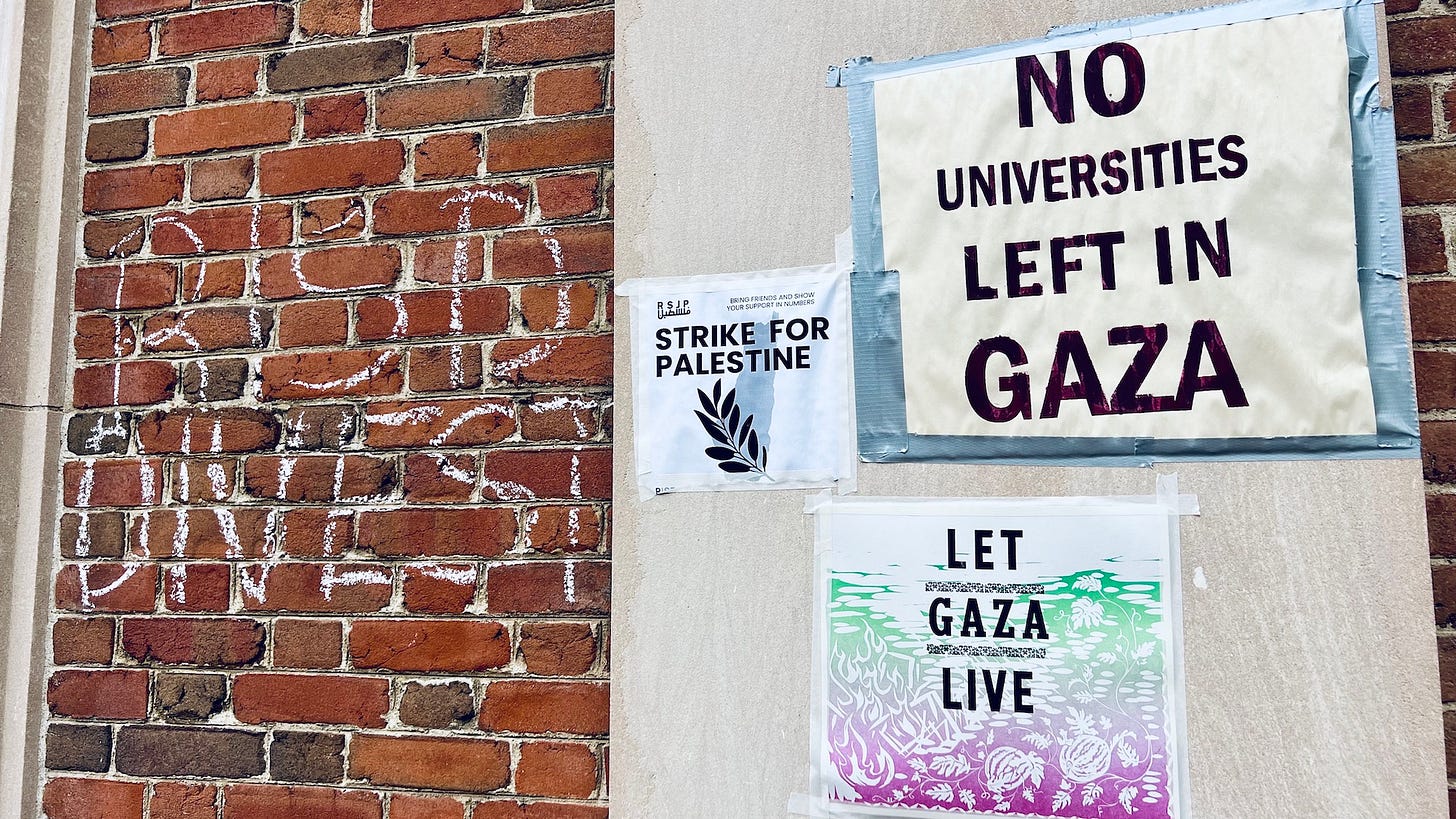
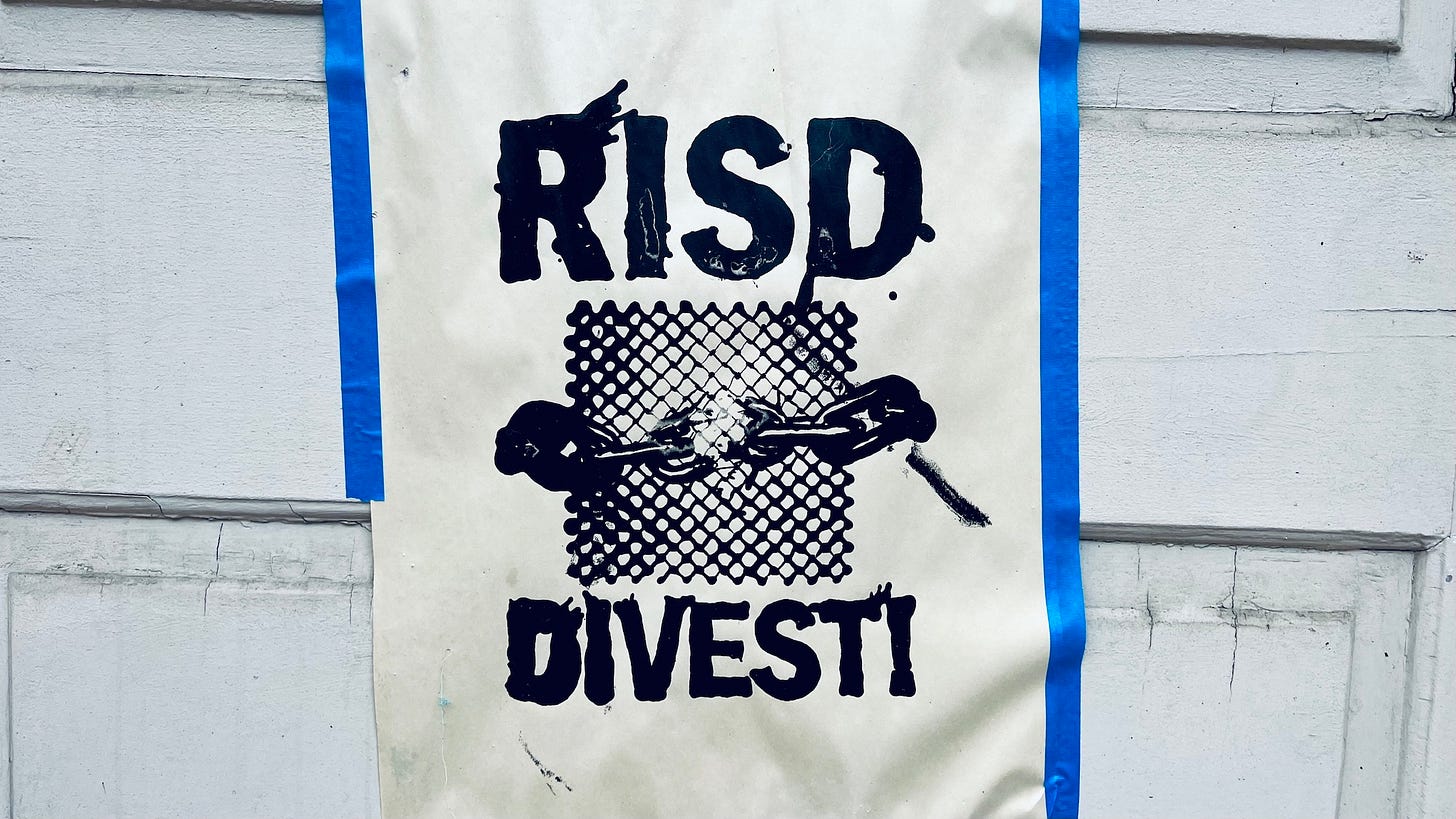
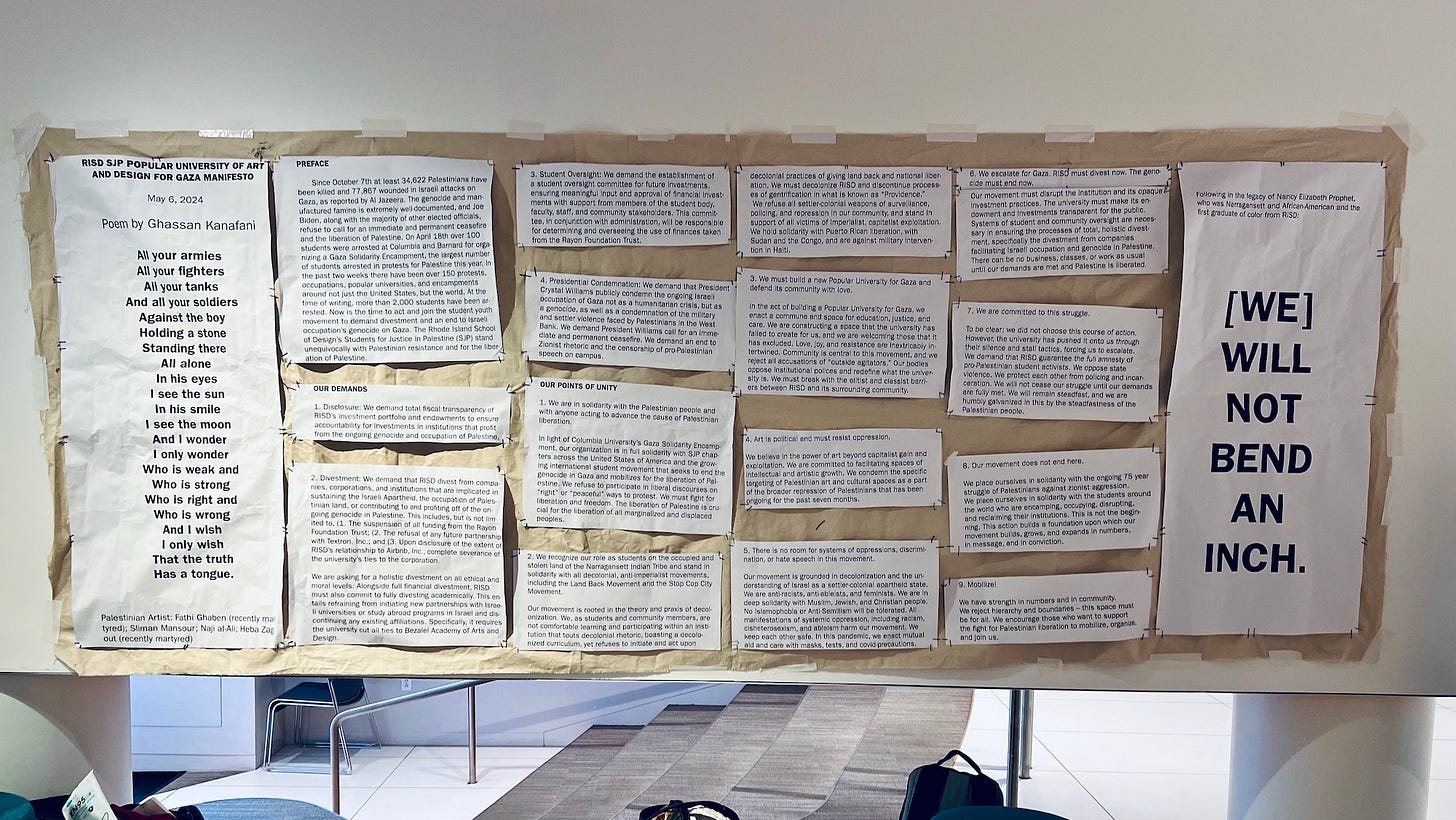
seems to me these so-called pro-Palestinian protests do Palestinians no good at all, indeed may make it worse for them since one reason Hamas is now refusing a cease-fire offer is to keep the protests going. Their noise annoys people nearby and does nothing to encourage either Hamas or Israel to stop their appalling destructive policies. The only real beneficiaries of the protests and chaos on campuses are likely to be Trump and his allies, and with the 1968 protests and chaos in mind that helped elect Nixon, perhaps they are supporting instigators on both sides.
I'll add it is likely nobody will help rebuild Gaza unless Hamas is gone - the've used much past aid to build military infrastructure that has led Gazans to disaster, and as they've said they will massacre Israelis again as soon as they are able, donors will see the resulting Israeli retaliation as destroying their rebuilding efforts. The Neranyahu regime also needs to go, they are also incapable of living in peace wirth their neighbors.
What is needed is a cease-fire, return of hostages, and much more humnaitarian aid asap. Forget the name-calling - apartheid, terrorists, genocide, Islamofascists etc all that gets in the way of reaching deals that require some mutual understanding.